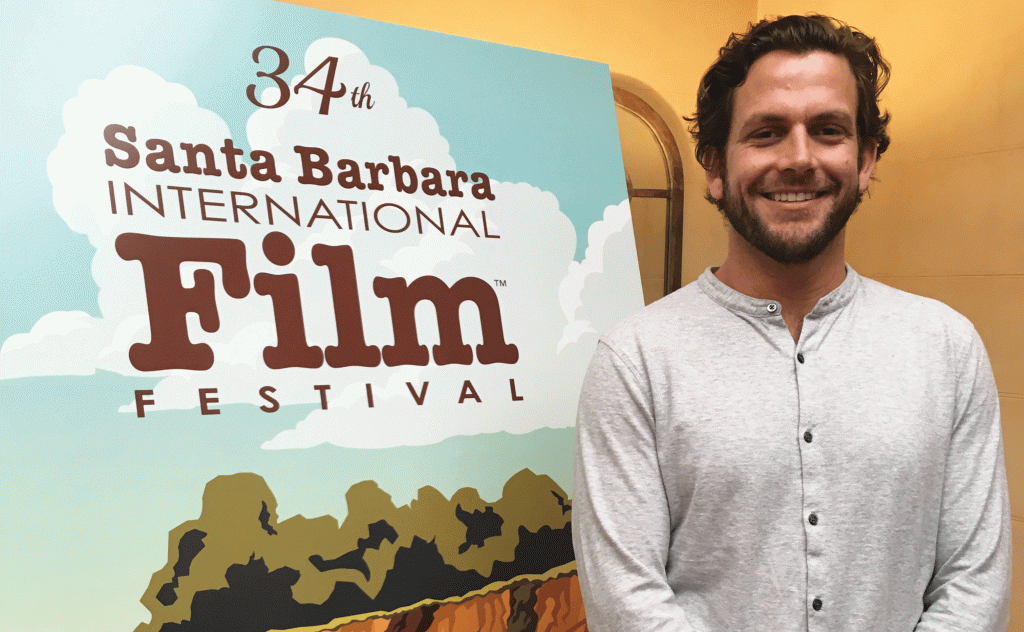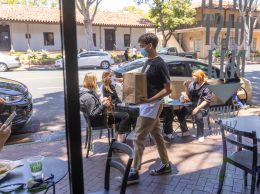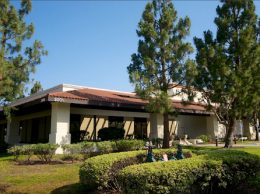
The Santa Barbara International Film Festival will close with the premier of “Spoons: A Santa Barbara Story,” a film exploring the emergence of surf culture in Santa Barbara, directed by UC Santa Barbara graduate Wyatt Daily.
The Santa Barbara International Film Festival will increase its presence in downtown Santa Barbara, with plans to move its year-round educational program into its current rental space at 1330 State St.
In what looks to be a top grossing year for the 34th annual festival, it will also honor regional roots, kicking off and closing the 10-day event with films made by Santa Barbara residents.
“This year we are outpacing any other year,” said Executive Director Roger Durling, who needs a strong performance to reverse a one-year drop in attendance.
The Thomas fire and subsequent debris flows caused a drop in attendance in 2018, but Durling told the Business Times that some 2019 festival passes have already sold out. The more expensive passes that provide priority access and admittance to parties remain available, he added.
The festival, which runs Jan. 30 to Feb. 9, will feature 59 U.S. premieres and 63 world premieres from 48 countries, along with tributes to top 2018 talent, panel discussions and free community education and outreach programs.
Across the Tri-Counties, nonprofit film festivals encourage tourism and hotel bookings during off-season months. They also tackle issues such as arts accessibility, education and environmental issues in local communities.
“The big myth is that arts are a charity instead of an economic force,” said Sarah York Rubin, executive director of the Santa Barbara County Office of Arts and Culture. “They are great to support, but arts are a legitimate business.”
The SBIFF in particular, Rubin noted, employs people year-round and retains permanent offices, which contributes to the local economy. In general, research shows that revenue from film festival tickets often goes back into the community, she said.
Smaller film festivals, like the Ojai Film Festival, the San Luis Obispo International Film Festival and the NatureTrack Film Festival in Los Olivos, may run for a week or two, but they attract international filmmakers and both local and out-of-town attendees.
“Instead of buying something on Amazon, people are investing in and experiencing the community, so that money stays in the community,” Rubin said.
The new 3,600-square-foot location on State Street will serve as the SBIFF’s education center, and updates will include creative classrooms, a screening room, community meeting space and an editing suite for filmmakers.
Durling noted that the festival had been searching for a permanent space for its programs for some time. The Barbakow Family Center for Film Studies evolved through a low-cost rent agreement with the Hutton Parker Foundation.
This comes after the festival’s acquisition of the Riviera theatre in 2016, which has since nearly completed a $5 million renovation, including sound, projector and technical updates.
This year’s festival will open at the Arlington Theatre in downtown Santa Barbara with “Diving Deep: The Life and Times of Mike deGruy,” a documentary about the late biologist, directed by his wife Mimi deGruy.
It will also close at the Arlington with the premier of “Spoons: A Santa Barbara Story,” a film exploring the emergence of surf culture in Santa Barbara, directed by UC Santa Barbara graduate Wyatt Daily.
Both an opening night gala and a closing night part will be sponsored by Amazon Studios, and for the first time Netflix will sponsor the festival’s Film Studies program, which helps students from across the nation attend the screenings and Q&A sessions.
“I think studios want to support a film festival,” Durling said, noting that this is the second year Amazon Studios has been a sponsor.
SBIFF books more than 500 rooms with participating hotel sponsors, and the festival draws more than 90,000 attendees, said Sherry Stimatz, the nonprofit’s hospitality liaison.
In Los Olivos, The NatureTrack festival, the only nature-focused film festival between San Francisco and Los Angeles, will take place from March 22-24. The festival will showcase at least 55 films with six premiers.
Last year, it filled 20 rooms at the Hampton Inn and Suites in Buellton with 15 filmmakers and people associated with the film, and it was attended by 1,000 viewers in three venues, said Director Sue Eisaguirre.
“We’ve already seen a surge in the number of filmmakers and people associated with the film who want to come,” Eisaguirre said, noting that this year 24 filmmakers and related parties expressed interest.
Attendees at the Ojai Film Festival last year, which will run Oct. 31 through Nov. 10 in 2019, numbered about 3,000, said Vice President Steve Grumette.
This year, it will be using two venues, and showing around 60 to 80 films.
“This is such a small town, that any large amount of visitors will have an impact,” Grumette said. He noted that although host housing is provided to filmmakers, “usually everything is filled in town,” including the Ojai Valley Inn.
• Contact Annabelle Blair at ablair@pacbiztimes.com.






 Print
Print Email
Email

















